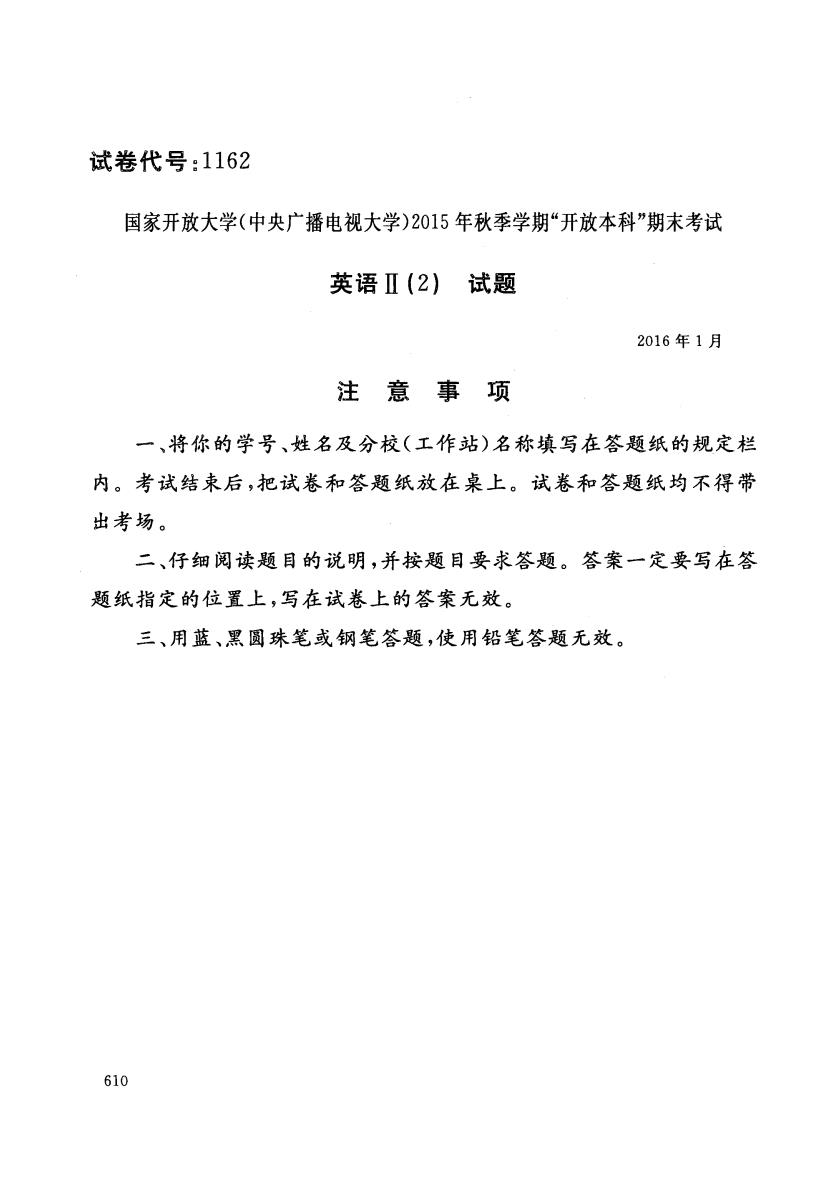
试卷代号:1162 国家开放大学(中央广播电视大学)2015年秋季学期“开放本科”期末考试 英语Ⅱ(2)试题 2016年1月 注意事项 一、将你的学号、姓名及分校(工作站)名称填写在答题纸的规定栏 内。考试结束后,把试卷和答题纸放在桌上。试卷和答题纸均不得带 出考场。 二、仔细阅读题目的说明,并按题目要求答题。答案一定要写在答 题纸指定的位置上,写在试卷上的答案无效。 三、用蓝、黑圆珠笔或钢笔答题,使用铅笔答题无效。 610
试卷代号 :1162 国家开放大学(中央广播电视大学)2015 年秋季学期"开放本科"期末考试 英语 11 (2) 试题 2016 注意事项 一、将你的学号、姓名及分校(工作站)名称填写在答题纸的规定栏 内。考试结束后,把试卷和答题纸放在桌上。试卷和答题纸均不得带 出考场。 二、仔细阅读题目的说明,并按题目要求答题。答案一定要写在答 题纸指定的位置上,写在试卷上的答案无效。 三、用蓝、黑圆珠笔或钢笔答题,使用铅笔答题无效。 610
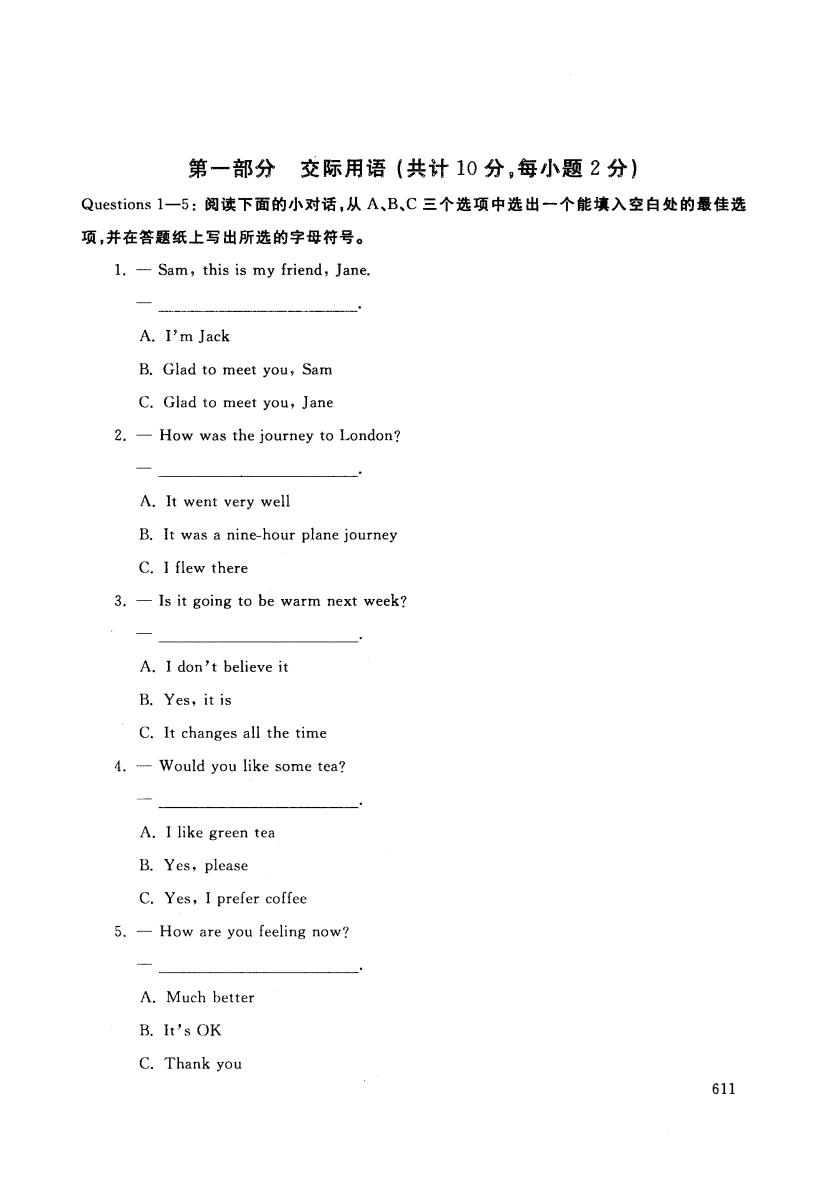
第一部分交际用语(共计10分,每小题2分) Questions1一5:阅读下面的小对话,从A、B、C三个选项中选出一个能填入空白处的最佳选 项,并在答题纸上写出所选的字母符号。 1.-Sam,this is my friend,Jane. A.I'm Jack B.Glad to meet you,Sam C.Glad to meet you,Jane 2.-How was the journey to London? 一 A.It went very well B.It was a nine-hour plane journey C.I flew there 3.-Is it going to be warm next week? A.I don't believe it B.Yes,it is C.It changes all the time 4.-Would you like some tea? A.I like green tea B.Yes,please C.Yes,I prefer coffee 5.-How are you feeling now? A.Much better B.It's OK C.Thank you 611
第一部分 交际用语(共计 10 每小题 分) Questions 1-5: 阅读下面的小对话,从 三个选项中选出一个能填入空白处的最佳选 项,并在答题纸上写出所选的字母符号。 1. - Sam , this is my friend , J ane. A. Fm Jack B. Glad to meet you , Sam c. Glad to meet you , Jane 2. - How was the journey to London? A. It went very well B. It was a nine-hour plane journey C. 1 flew there 3. - Is it going to be warm next week? A. 1 don' t believe it B. Yes, it is C. It changes all the time 4. - Would you like some tea? A. 1 like green tea B. Y es, please C. Yes, 1 prefer coffee 5. - How are you feeling now? A. Much better B. It 's OK C. Thank you 611
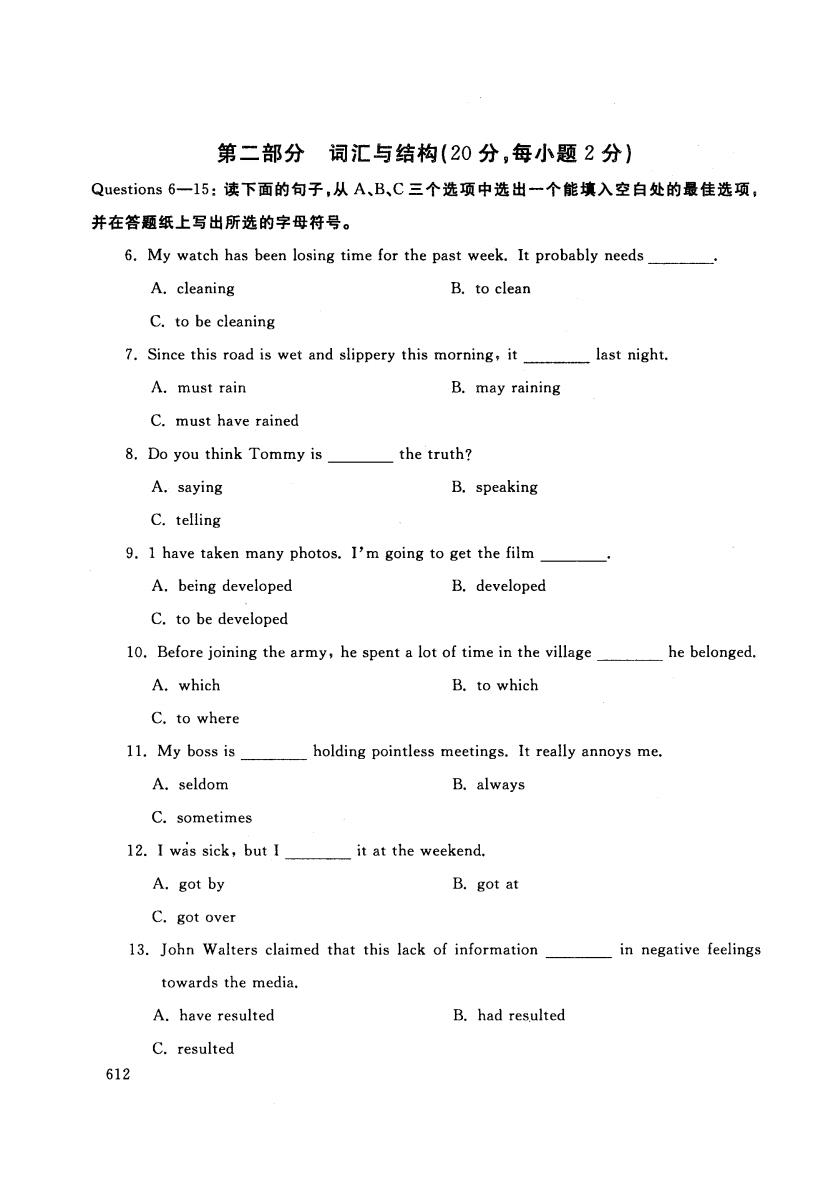
第二部分词汇与结构(20分,每小题2分) Questions6一l5:读下面的句子,从A、B、C三个选项中选出一个能填入空白处的最佳选项, 并在答题纸上写出所选的字母符号。 6.My watch has been losing time for the past week.It probably needs A.cleaning B.to clean C.to be cleaning 7.Since this road is wet and slippery this morning,it last night. A.must rain B.may raining C.must have rained 8.Do you think Tommy is the truth? A.saying B.speaking C.telling 9.1 have taken many photos.I'm going to get the film A.being developed B.developed C.to be developed 10.Before joining the army,he spent a lot of time in the village he belonged. A.which B.to which C.to where 11.My boss is holding pointless meetings.It really annoys me. A.seldom B.always C.sometimes 12.I was sick,but I it at the weekend. A.got by B.got at C.got over 13.John Walters claimed that this lack of information in negative feelings towards the media. A.have resulted B.had resulted C.resulted 612
第二部分 词汇与结构 (20 每小题 分) Questions 15: 读下面的旬子,从 三个选项中选出一个能填入空白处的最佳选项, 并在答题纸上写出所选的字母符号。 6. My watch has been losing time for the past week. It probably needs 一一一-- A. cleaning B. to clean C. to be cleaning 7. Since this road is wet and slippery this morning , it 一一一一一一 last night. A. must rain C. must have rained 8. Do you think Tommy is A. saying C. telling B. may raining the truth? B. speaking 9. 1 have taken many photos. I'm going to get the film 一一一一一· A. being developed C. to be developed B. developed 10. Before joining the army , he spent a lot of time in the village 一一一一_ he belonged. A. which B. to which C. to where 11. My boss is 一一一一一_ holding pointless meetings. It really annoys me. A. seldom C. sometimes 12. 1 wàs sick , but 1 A. got by C. got over B. always it at the weekend. B. got at 13. J ohn Walters claimed that this lack of information towards the media. 612 A. have resulted C. resulted B. had resulted in negative feelings
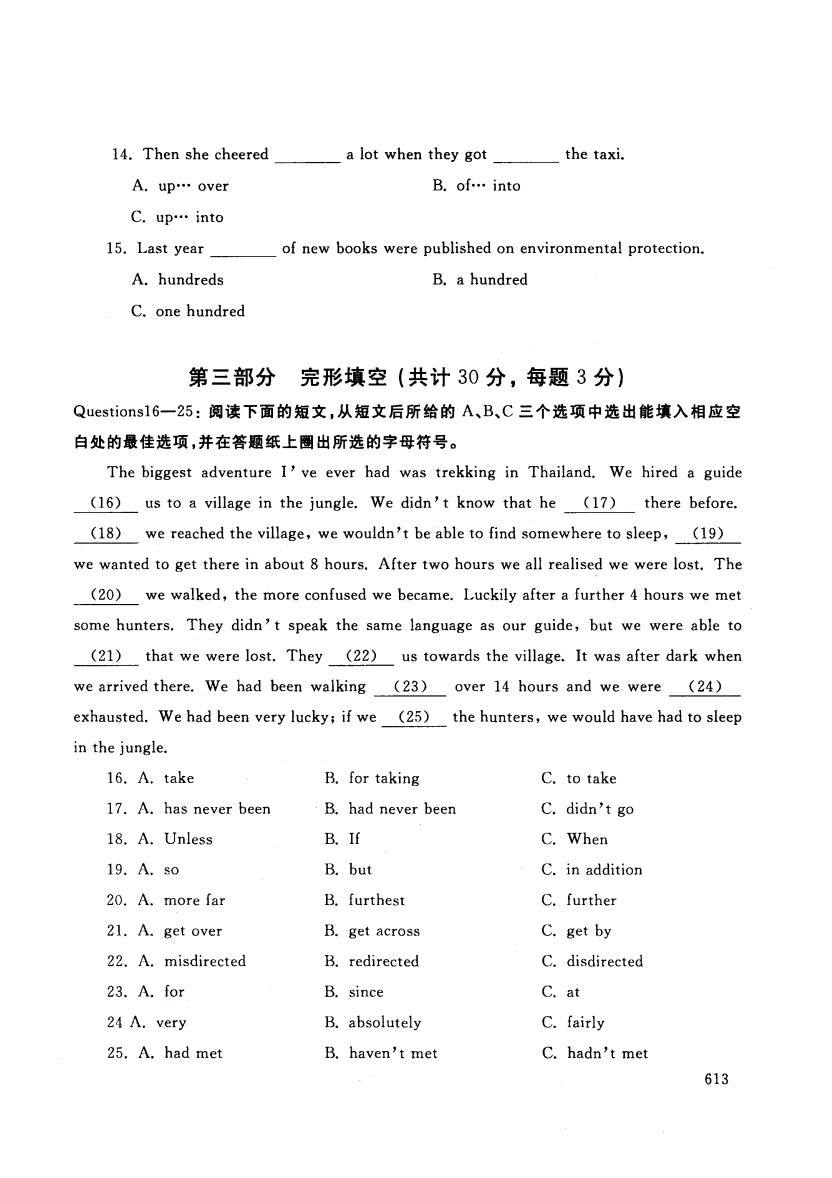
14.Then she cheered a lot when they got the taxi. A.up…over B.of…into C.up…into 15.Last year of new books were published on environmental protection. A.hundreds B.a hundred C.one hundred 第三部分完形填空(共计30分,每题3分) Questions16一25:阅读下面的短文,从短文后所给的A、B、C三个选项中选出能填入相应空 白处的最佳选项,并在答题纸上圈出所选的字母符号。 The biggest adventure I've ever had was trekking in Thailand.We hired a guide (16)us to a village in the jungle.We didn't know that he (17)there before. (18)we reached the village,we wouldn't be able to find somewhere to sleep,(19) we wanted to get there in about 8 hours.After two hours we all realised we were lost.The (20)we walked,the more confused we became.Luckily after a further 4 hours we met some hunters.They didn't speak the same language as our guide,but we were able to (21)that we were lost.They (22)us towards the village.It was after dark when we arrived there.We had been walking (23)over 14 hours and we were (24) exhausted.We had been very lucky;if we (25)the hunters,we would have had to sleep in the jungle. 16.A.take B.for taking C.to take 17.A.has never been B.had never been C.didn't go 18.A.Unless B.If C.When 19.A.s0 B.but C.in addition 20.A.more far B.furthest C.further 21.A.get over B.get across C.get by 22.A.misdirected B.redirected C.disdirected 23.A.for B.since C.at 24 A.very B.absolutely C.fairly 25.A.had met B.haven't met C.hadn't met 613
14. Then she cheered 一一一一一 lot when they got 一一一一一 the taxi. A. up'" over c. up'" into 15. Last year A. hundreds C. one hundred B. of... into of new books were published on environmental protection. B. a hundred 第三部分 完形填空(共计 30 分,每题 分) Questions16 25: 阅读下面的短文,从短文后所错的 三个选项中选出能填入相应空 白处的最佳选项,并在答题纸上圈出所选的字母符号。 The biggest adventure l' ve ever had was trekking in Thailand. We hired a guide (6) us to a village in the jungle. We didn' t know that he (17) there before. (8) we reached the vil1age , we wouldn't be able to find somewhere to sleep , (1 9) we wanted to get there in about 8 hours. After two hours we all realised we were lost. The (20) we walked , the more confused we became. Luckily after a further 4 hours we met some hunters. They didn' t speak the same language as our guide , but we were able to (21) that we were lost. They (22) us towards the village. It was after dark when we arrived there. We had been walking (23) over 14 hours and we were (24) exhausted. We had been very lucky; if we (25) the hunters, we would have had to sleep in the jungle. 16. A. take B. for taking C. to take 17. A. has never been B. had never been C. didn't go 18. A. Unless B. If C. When 19. A. so B. but C. in addition 20. A. more far B. furthest C. further 21. A. get over B. get across C. get by 22. A. misdirected B. redirected C. disdirected 23. A. for B. since c. at 24 八. very B. absolutely C. fairly 25. A. had met B. haven' t met C. hadn' t met 613
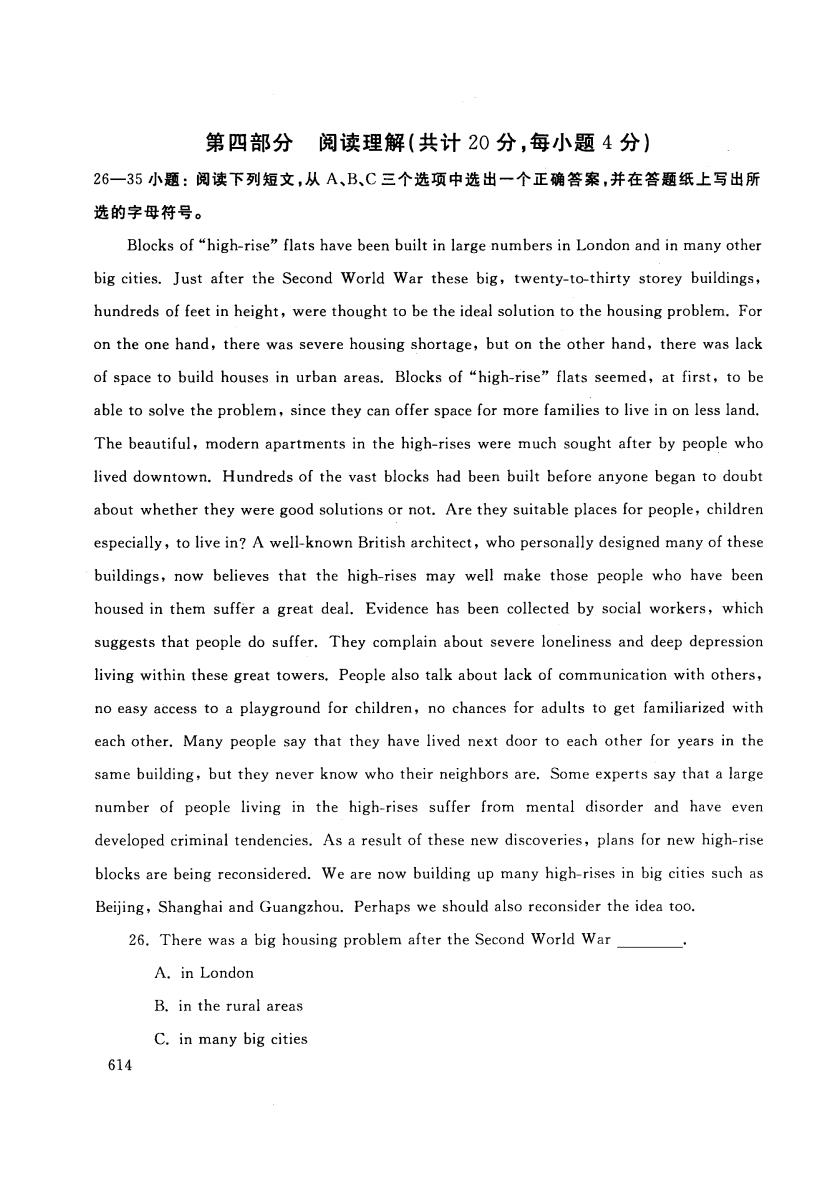
第四部分阅读理解(共计20分,每小题4分) 26一35小题:阅读下列短文,从A、B、C三个选项中选出一个正确答案,并在答题纸上写出所 选的字母符号。 Blocks of "high-rise"flats have been built in large numbers in London and in many other big cities.Just after the Second World War these big,twenty-to-thirty storey buildings, hundreds of feet in height,were thought to be the ideal solution to the housing problem.For on the one hand,there was severe housing shortage,but on the other hand,there was lack of space to build houses in urban areas.Blocks of "high-rise"flats seemed,at first,to be able to solve the problem,since they can offer space for more families to live in on less land. The beautiful,modern apartments in the high-rises were much sought after by people who lived downtown.Hundreds of the vast blocks had been built before anyone began to doubt about whether they were good solutions or not.Are they suitable places for people,children especially,to live in?A well-known British architect,who personally designed many of these buildings,now believes that the high-rises may well make those people who have been housed in them suffer a great deal.Evidence has been collected by social workers,which suggests that people do suffer.They complain about severe loneliness and deep depression living within these great towers.People also talk about lack of communication with others, no easy access to a playground for children,no chances for adults to get familiarized with each other.Many people say that they have lived next door to each other for years in the same building,but they never know who their neighbors are.Some experts say that a large number of people living in the high-rises suffer from mental disorder and have even developed criminal tendencies.As a result of these new discoveries,plans for new high-rise blocks are being reconsidered.We are now building up many high-rises in big cities such as Beijing,Shanghai and Guangzhou.Perhaps we should also reconsider the idea too. 26.There was a big housing problem after the Second World War A.in London B.in the rural areas C.in many big cities 614
第四部分 阅读理解(共计 20 分,每小题 分) 26-35 小题:阅读下列短文,从 三个选项中选出一个正确答案,并在答题纸上写出所 选的字母符号。 Blocks of "high-rise" flats have been built in large numbers in London and in many other big cities. Just after the Second World War these big , twenty-to-thirty storey buildings, hundreds of feet in height , were thought to be the ideal solution to the housing problem. For on the one hand , there was severe housing shortage , but on the other hand , there was lack of space to build houses in urban areas. Blocks of "high-rise" flats seemed , at first , to be able to solve the problem , since they can offer space for more families to live in on less land. The beautiful , modern apartments in the high-rises were much sought after by people who lived downtown. Hundreds of the vast blocks had been built before anyone began to doubt about whether they were good solutions or not. Are they suitable places for people , children especially , to live in? A well-known British architect , who personally designed many of these buildings, now believes that the high-rises may well make those people who have been housed in them suffer a great deal. Evidence has been collected by social workers , which suggests that people do suffer. They complain about severe loneliness and deep depression living within these great towers. People also talk about lack of communication with others, no asy access to a playground for children , no chances for adults to get familiarized with each other. 1any people say that they have lived next door to each other for years in the same building , but they never know who their neighbors are. Some experts say that a large number of people living in the high-rises suffer from mental disorder and have even developed criminal tendencies. As a result of these new discoveries , plans for new high-rise blocks are being reconsidered. We are now building up many high-rises in big cities such as Beijing , Shanghai and Guangzhou. Perhaps we should also reconsider the idea too. 26. There was a big housing problem after the Second W orld War 一一一一一一· 614 A. in London B. in the rural areas c. in many big cities